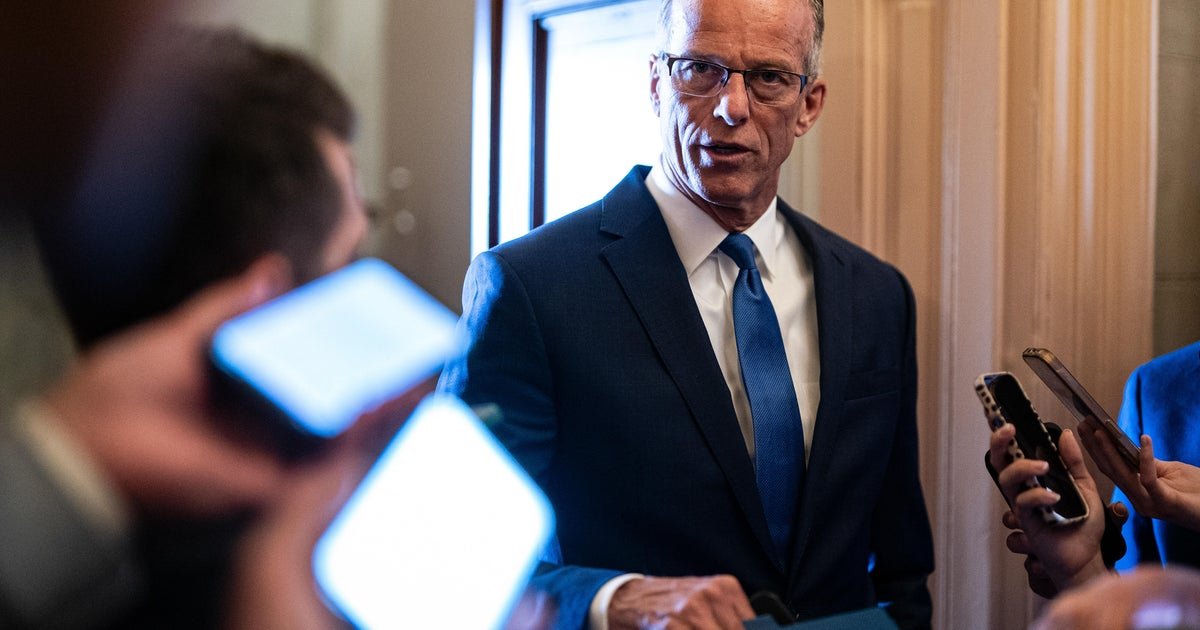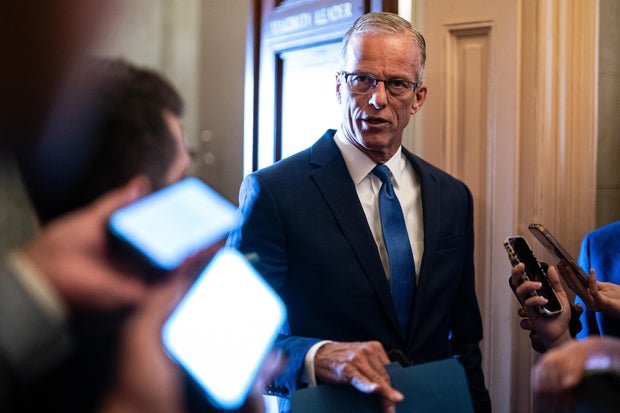[ad_1]
Washington — The Senate is forging ahead this week on President Trump’s “one big beautiful bill,” facing a tight, self-imposed deadline to get the legislation to his desk ahead of the July 4 holiday.
“It’s going to be a busy month — we have a lot to get done,” Senate Majority Leader John Thune said on the Senate floor Monday, adding that the upper chamber’s “biggest focus” will be on getting the president’s agenda passed.
In a razor-thin vote last month, the House passed the legislation, which addresses the president’s tax, defense and energy priorities. The vote came after weeks of intraparty disagreement over a number of provisions, like Medicaid restrictions. That bill has now made its way to the Senate, where some of the same tensions exist — and new dynamics have begun to take shape.
Thune, a South Dakota Republican, outlined to reporters Monday that the process is underway, saying “I think we’re on track — I hope, at least — to be able to produce something that we can pass through the Senate, send back to the House, have them pass and put on the president’s desk by the Fourth of July.”
But Thune can only afford to lose three Republican votes on the bill, with all Democrats expected to vote against it. A handful of Senate Republicans have already expressed opposition to the House-passed bill. GOP leaders will be focused on uniting the conference around the bill, and possible changes, in the days ahead.
Al Drago/Bloomberg via Getty Images
The majority leader acknowledged the delicate balance on Monday, telling reporters that the Senate bill will “have to be tracked fairly closely, obviously, with the House bill,” citing its “fragile majority.” Thune said the House “struck a very delicate balance in getting it passed in the House in the first place.”
“But there are some things that senators want, you know, added to the bill, or, you know, things that we would do slightly differently,” Thune said.
Meanwhile, the president took an active role in the process as the Senate returned to Washington from recess on Monday. He met with Thune and spoke with a handful of key Senate Republicans, including Sens. Ron Johnson of Wisconsin and Josh Hawley of Missouri, who have expressed opposition to some of the bill’s components.
Johnson, along with Sen. Rand Paul of Kentucky, has been among the leading voices in the upper chamber calling for deeper spending cuts in the bill, which aims at present to cut $1.5 trillion, while also advocating for separating a debt ceiling increase from the legislation.
The Wisconsin Republican said he had a “very respectful conversation” with Mr. Trump, telling reporters that he and the president “by and large share the same goal,” but have a “difference in opinion in terms of how to do it.”
Paul has pledged to oppose the bill due to its debt ceiling increase. Mr. Trump again called out the Kentucky Republican on Truth Social on Tuesday, saying Paul “votes NO on everything, but never has any practical or constructive ideas.”
Beyond concern about spending cuts, other Senate Republicans have voiced concern for Medicaid restrictions, including Hawley. The Missouri Republican told reporters Monday that the president told him when they spoke that there should be “no Medicaid benefit cuts,” adding that he told Mr. Trump that they are “singing from the same hymnbook.” But Hawley remains concerned about changes to provider taxes and copay requirements in the legislation.
The president also weighed in on Truth Social on Monday, urging Senate Republicans to work quickly on the bill.
“With the Senate coming back to Washington today, I call on all of my Republican friends in the Senate and House to work as fast as they can to get this Bill to MY DESK before the Fourth of JULY,” Mr. Trump wrote.
Further complicating matters, the Senate also has to contend with strict limits on the reconciliation process, which governs the legislation. Though the process allows the Senate to bypass a 60-vote threshold required to advance most legislation, it also comes with its own hurdles. Under what’s known as the Byrd rule, all provisions in the legislation must have direct budgetary consequences. And senators may challenge any portion of the bill that they say doesn’t deal with taxes, spending or the debt limit and ask the Senate parliamentarian to resolve the dispute.
Thune said “Byrd conversations” have been going on for the last week and would continue this week and next. And when asked whether Senate Republicans would rule out overruling the parliamentarian, he told reporters “we’re not going there.”
and
contributed to this report.
[ad_2]




